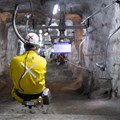
Glencore had a mixed performance so far in 2024
Glencore's financial metrics present a worrying picture. The company's adjusted EBITDA fell by 33% to $6.3bn compared to the same period last year.
This decline reflects lower average prices for key commodities, particularly thermal coal, which has been significantly impacted by market normalisation following the extreme volatility of 2022/23.
The overall group reported a net loss attributable to equity holders of $233m, which is made worse by $1.7bn in significant items, including approximately $1bn in impairment charges.
The company's industrial assets saw a sharp 39% decline in adjusted EBITDA, primarily driven by a $2.7bn lower contribution from coal operations.
This is a symptom of period-over-period declines in key thermal coal pricing benchmarks.
Additionally, the impairment charges, mainly relating to South African coal operations and the transition of Koniambo to care and maintenance, have further strained Glencore's financial health.
Strong metals performance
The reduction in energy contributions due to prior elevated volatilities was partially offset by a strong metals performance in the first half of 2024.
"The progressive normalisation of energy markets, from the severe disruption and extreme volatilities seen in 2022/23, saw Energy and steelmaking coal adjusted EBIT fall 68% to $0.3bn," explained Nagle.
Despite a reduction in net debt, Glencore's financial stability remains under scrutiny.
Net debt, including marketing-related lease liabilities, ended the first half at $3.6bn, which is down from $4.9bn at the end of 2023.
However, the company's future cash outflows, particularly the $6.9bn for the Elk Valley Resources (EVR) acquisition, are a potential risk.
This relatively modest gap of $0.3bn, together with the $1bn Viterra cash disposal proceeds expected to be received over the next several months and noting the healthy current spot illustrative annualised free cash flow generation of c.$6.1bn, augers well for potential top-up shareholder returns, above our base cash distribution, in February 2025.
Future outlook
Glencore's strategic decisions, including the retention of the coal and carbon steel materials business, aim to stabilise cash flow and support future investments in transition metals.
Despite these efforts, the company's financial performance and market conditions will require careful navigation to overcome existing challenges and achieve sustainable growth.
“The strength of our diversified business model across marketing and industrial has proven itself adept in a range of market conditions, giving us a solid foundation to successfully navigate the near-term macroeconomic uncertainty," concluded Nagle.

































































